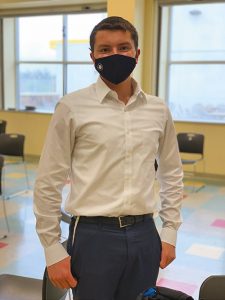Beni Romm ’21 Talks Tanach
April 22, 2021
 The night before Yom Ha’atzmaut, Beni Romm, a Yeshivat Frisch senior from White Plains, went to sleep before the sun, at 7:30 p.m. Romm, the first place winner of the 2020 Dr. Shimshon Issacheroff Chidon HaTanach USA, needed to be ready to represent America at the International Chidon HaTanach, scheduled for 4:00 a.m. EST (11:00 a.m. Israeli time). By 2:30 a.m., his tech connection was up and running. In an ordinary year, Romm and fellow competitors, from around the world, would have spent a week touring Israel and bonding. However, COVID-19 meant that only Israelis would be on stage at Jerusalem’s Binyanei Ha’Umah; everyone else was virtual. By the time most of America woke up, Romm had climbed to the top three in the notoriously difficult competition, with Israeli contestants gaining the other top slots.
The night before Yom Ha’atzmaut, Beni Romm, a Yeshivat Frisch senior from White Plains, went to sleep before the sun, at 7:30 p.m. Romm, the first place winner of the 2020 Dr. Shimshon Issacheroff Chidon HaTanach USA, needed to be ready to represent America at the International Chidon HaTanach, scheduled for 4:00 a.m. EST (11:00 a.m. Israeli time). By 2:30 a.m., his tech connection was up and running. In an ordinary year, Romm and fellow competitors, from around the world, would have spent a week touring Israel and bonding. However, COVID-19 meant that only Israelis would be on stage at Jerusalem’s Binyanei Ha’Umah; everyone else was virtual. By the time most of America woke up, Romm had climbed to the top three in the notoriously difficult competition, with Israeli contestants gaining the other top slots.
For Romm, the experience of studying Tanach has been an immersive one, suffused with religious meaning. “The study of any literature allows one to appreciate the mind of its author,” explained Romm. “When one immerses himself in a particular canon of literature, he finds his thoughts shaped by and expressed in terms of the literature he is studying. This takes on religious significance when that literature is Tanach, and one realizes that his own mind is being brought into greater alignment with the Perfect Mind, the ultimate Author of the Tanach.”
Romm’s favorite part of Tanach? “Kohelet, by virtue of the fact that it’s in Tanach at all,” he said. “It raises many of the sentiments extolled as the pinnacle of wisdom by today’s ‘New Atheists’ (an apt demonstration of its own aphorism, ‘Ein chadash tachat hashemesh,’ There is nothing new under the sun). By canonizing it, the (proto-)rabbis acknowledged that such musings, while poignant, are not the end of wisdom and man’s search for spiritual fulfillment, but only its beginning. ‘Sof davar hakol nishma, et ha-Elokim yera ve’et mitzvotav shemor’” “The end of the matter, all having been heard: fear God, and keep his commandments; for this is the whole man.”

Romm also learned about what it takes to advance in the Chidon, striving for the seemingly impossible. “In general, long term, your brain is capable of so much more than you think it is,” said Romm. “Your memory and your mind is a muscle, just like anything else. And if you work it with discipline, you can learn far more than you thought capable.” Romm also thanked his Chidon coach, Frisch Hebrew Department Chair and 2016 International Adult Chidon HaTanach Champion Rabbi Yair Shahak, “for his dedication to helping me prepare for the International Chidon. His coaching and advice have been invaluable.”
One of Shahak’s goals was to give Romm strategies to remember the tiniest details, and know as much as possible. “He studied day and night,” said Shahak, noting that Romm has a natural affinity for spotting connections in the text. “One of the things that struck me about Beni is how much he relies on and utilizes simple logic based on linguistic and historical sources to be able to identify answers. For example, he correctly identified that metziltayim (cymbals) only appears during Bayit Sheini, so any quote with that word will only appear in Ezra, Nehemiah or Divrei Hayamim. Or, for example, knowing the history and geography of empires—that also played into his success. To say that it’s been a joy learning with him is an understatement.”
Over the course of high school, Romm said that his Jewish education “has really come from both sides of the faculty: Judaic and secular studies. This is a really unique aspect of Frisch.” Outside the classroom, he founded a Chidon Club at Frisch and recruited a large membership. Earlier this year, 17 Frisch students advanced past the preliminary exam to the national round of the Chidon this May. When asked what advice he would give to new participants, Romm cited Mishlei 23:1: כי תצא ללחום את מושל בין תבין את אשר לפניך, “When you go out to fight against the ruler, you have to understand very well what’s in front of you,” said Romm.
“This holds true for every goal in life,” he explained. “You really have to understand what target you’re trying to achieve. With that in mind you can work towards that goal and be successful. My goal was really to master the material and win, and in that way I was able to gain a greater mastery of the material than if I were learning ‘lishma.’”
Yet, Romm is certainly no stranger to learning for its own sake. Now that the Chidon is over, he has set new goals: learn the remaining parts of Nevi’im Achronim to the same level which he prepared for the Chidon (“functionally equivalent to memorization”), sharpen his existing leining knowledge and complete shnayim mikra with the Septuagint with Koine Greek—with the aspiration of learning Greek so that he can study Second Temple and Mishnaic Judaism in college.
His work for the Chidon helped with it all. “As you’re learning you’re immediately, automatically connecting in your head all the places where similar words appear in Tanach,” he said, “as if you have a concordance in the back of your mind, and that’s a very useful tool to have.”
Romm believes that his ability to lein was indispensable in helping him learn and memorize as much as he did. He noted that boys are usually taught this skill in preparation for their bar mitzvah, while girls are not. This, to his mind, perpetuates a systemic inequality, to use contemporary terminology, when it comes to memorizing the text of the Torah and Nevi’im. “I think that this is not an ideal situation, because the Torah should be open equally to everyone,” said Romm. “We should not be putting pedagogical barriers in front of women when it comes to gaining mastery of Tanach.
“If I were to approach this problem, I would recommend that the community reconceptualize what the role of leining is—the learning of how to read and chant the Torah trop—and how it’s taught,” he explained. “Currently in the community, leining is associated with the public reading of Torah and Haftarah in the synagogue, but historically this was never the purpose of the leining. Cantillation exists not just in the parts that are read aloud in the synagogue but in all of Tanach, because it’s there to serve as both punctuation and an aid to memorization. Therefore, the skill of leining is not a skill in kriat Torah, but talmud Torah. Such that in order for there to be equality in the acquisition of skills in this area, Jewish schools should allocate class time to teaching the ta’amei mikra and how to lein.”
Romm is graduating from Frisch this year, and plans to major in mechanical engineering at the University of Pennsylvania following study at Yeshivat Har Etzion. He described the experience of briefly meeting people from Israel and around the world through the virtual Chidon programming as one of the highlights of the Chidon experience. “I hope to meet as many as I can next year in Israel,” he said.






 The night before Yom Ha’atzmaut, Beni Romm, a Yeshivat Frisch senior from White Plains, went to sleep before the sun, at 7:30 p.m. Romm, the first place winner of the 2020 Dr. Shimshon Issacheroff Chidon HaTanach USA, needed to be ready to represent America at the International Chidon HaTanach, scheduled for 4:00 a.m. EST (11:00 a.m. Israeli time). By 2:30 a.m., his tech connection was up and running. In an ordinary year, Romm and fellow competitors, from around the world, would have spent a week touring Israel and bonding. However, COVID-19 meant that only Israelis would be on stage at Jerusalem’s Binyanei Ha’Umah; everyone else was virtual. By the time most of America woke up, Romm had climbed to the top three in the notoriously difficult competition, with Israeli contestants gaining the other top slots.
The night before Yom Ha’atzmaut, Beni Romm, a Yeshivat Frisch senior from White Plains, went to sleep before the sun, at 7:30 p.m. Romm, the first place winner of the 2020 Dr. Shimshon Issacheroff Chidon HaTanach USA, needed to be ready to represent America at the International Chidon HaTanach, scheduled for 4:00 a.m. EST (11:00 a.m. Israeli time). By 2:30 a.m., his tech connection was up and running. In an ordinary year, Romm and fellow competitors, from around the world, would have spent a week touring Israel and bonding. However, COVID-19 meant that only Israelis would be on stage at Jerusalem’s Binyanei Ha’Umah; everyone else was virtual. By the time most of America woke up, Romm had climbed to the top three in the notoriously difficult competition, with Israeli contestants gaining the other top slots.